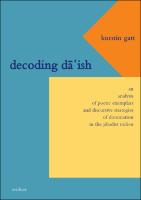Decoding DA’ISH
An Analysis of Poetic Exemplars and Discursive Strategies of Domination in the Jihadist Milieu
Abstract
Why do Jihadists compose poetry and what role does poetry play in the transmission of the jihadist ideology? Decoding DĀʿISH is located at the intersections of the literary, the religious, and the political in jihadist discourse. The study examines how the self-professed ‘Islamic State’ has twisted and manipulated the Arabic language, the classical Arabic ode, Islamic symbolism, traditions, and guiding myths to legitimate its political power and justify its violent policies. The discussion culminates in the analysis of Arabic poetry produced by the jihadist group by taking into consideration the socio-political context in the contemporary Iraq-Syria region. By drawing primarily upon numerous poems and chants, the author shows why our knowledge of the jihadist stream needs to be grounded in a thorough understanding of the cultural logics of mobilization, identity structures, and the belief systems and desires of these groups.
Keywords
Arab poetry; Contemporary history; Linguistics; Literary Studies; Literature; PoetologyDOI
10.29091/9783954905614ISBN
9783954905614, 9783954904723, 9783954905614Publisher
Reichert VerlagPublication date and place
2020Imprint
Reichert VerlagSeries
Literaturen im Kontext. arabisch – persisch – türkisch, 45Classification
Literary studies: plays and playwrights
c 1500 onwards to present day


 Download
Download Web Shop
Web Shop